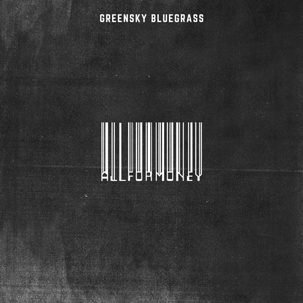Greensky Bluegrass Bends the Genre

Greensky Bluegrass treads on such a weird musical terrain. The quintet’s roster reads pretty close to that of a traditional bluegrass outfit, featuring dobro player, mandolinist, banjo player, guitarist, and an upright bassist. While their 2004 debut, Less than Supper, reflects that of a band very much steeped in bluegrass tradition and tropes, Greensky has since moved much closer to the realm of jam and roots rock.
It’s a transition that’s been gradual and, considering the massive success they’ve had on the jam band circuit in recent years, one that’s panned out well. Greensky continues to further those bona fides on All for Money, offering up a dozen songs ready to become part of the band’s on-stage repertoire.
A great many of the tracks on All for Money are constructed as vehicles to cut loose. “Courage for the Road,” the fifth song on the LP, is a perfect example. For the first two-and-a-half minutes or so, it’s a rowdy country-rocker. On the next five, Greensky really stretches out for extended dobro and banjo solos before returning to the song’s chorus and beginning melody to close out the last minute. Overall, it provides a snapshot of exactly what the band does best at this point in its career – it takes bluegrass instrumentation and flourishes and repurposes it in a fashion that highlights the musical flexibility of the members of the group and its abilities to bend bluegrass to fit its jam and rock aspirations.
But this skill, also displayed on tunes like the title track, “What You Need,” and, to a lesser extent, “Murder of Crows,” also reveals something about what it means to play bluegrass in the late 2010s.
Last summer, I reviewed an album by Justin Hiltner and Jon Weisberger. At the core of their pairing was the idea that bluegrass can and should expand beyond the common perception of the genre and the type of people playing it. And their album, Watch it Burn,proves that a more socially inclusive form of bluegrass is easily attainable.
In a recent interview I conducted with Greensky bassist Mike Devol, he said, “I don’t think we’re a bluegrass band. I like traditional bluegrass, but we don’t have an interest in being in something with all those rules. Our music doesn’t have that Nashville polish; we can be bluegrass in a rowdy way.”
On All for Money, Greensky Bluegrass shows that it does, in fact, play “in a rowdy way.” Look no further than the aforementioned tracks, the propulsive lead single “Do it Alone,” and the electric country-blues of “It’s Not Mine Anymore” to hear that. But by successfully and seamlessly incorporating more jam and rock overtones into a bluegrass setup, Greensky shows that maybe the rules governing bluegrass aren’t quite as rigid as one might think.



